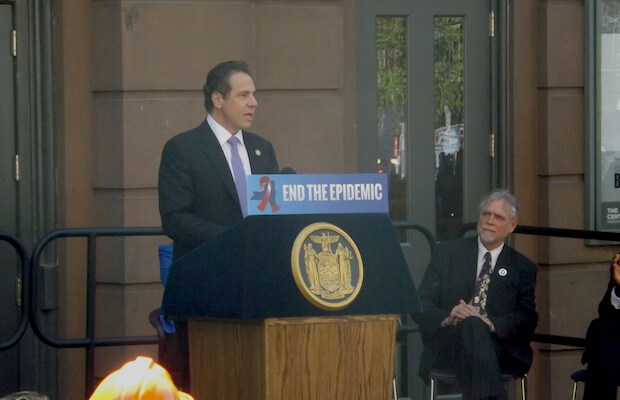A federal court judge has ruled that a client of the city’s HIV/ AIDS Services Administration (HASA) has alleged facts, that if proven in a trial, would make the LeFrak Organization, a major New York City realtor, liable for discrimination against people with HIV who are dependent on government support in paying their rent. In a December 13 decision, Judge Denise Cote refused to dismiss the case brought by a plaintiff, identified as L.C., who attempted to rent a unit at the LeFrak City in Queens.
Notified by HASA that she was eligible for rental support of $1,100, L.C. contacted the LeFrak rental office and was referred to a Queens Boulevard office that handles apartments for applicants paying their rent with such assistance. According to Cote’s opinion, LeFrak’s agents would not show L.C. an apartment until she provided a letter from HASA confirming that it would pay the $1,110, but the agency does not issue such letters until a client has been approved for a particular apartment. The realtor maintained the same posture even when Housing Works, an AIDS services group, called its agents on L.C.’s behalf.
Federal judge refuses to dismiss case against major New York realtor
The other plaintiff in the case, Fair Housing Justice Center (FHJC), sent “testers” to LeFrak to confirm what their policies are. One tester told staff at the realtor that she earned $46,000 a year and was looking for an apartment in the $1,100 range. She was shown floor plans and given an application to complete, with no request for immediate income verification. Two other testers said they were scouting apartments on behalf of a brother living with AIDS whose rent would be paid by HASA. Like L.C., they were asked for a HASA letter before LeFrak would proceed. The realtor also stated that criminal and credit checks would need to be completed prior to beginning an application, something not required of the tester who said she was employed. Those inquiring about apartments paid for with HASA funding are referred to an office where a glass window separates the applicants from LeFrak staff, unlike the regular rental office.
L.C. and FHJC filed a federal discrimination lawsuit in April, asserting claims under the US Fair Housing Act (FHA), which forbids housing discrimination against people with disabilities, and under the New York City Human Rights Law, which bans discrimination not only against people with disabilities but also based on a renter’s source of income. The complaint alleged that LeFrak’s policy represents intentional discrimination and also has a disproportionately adverse effect on people with disabilities.
LeFrak moved to dismiss the case, claiming that it did not intentionally discriminate against people with HIV, so the FHA claim lacked merit because a renter is not protected under federal law based on their source of income. Rejecting this argument, Judge Cote wrote that the complaint “alleges that LeFrak understood that HASA clients, alone of all persons requiring government housing subsidies, would be unable to produce a source-of-income letter at the application stage of the rental process. This is sufficient to give the defendants fair notice of the plaintiffs’ theory that LeFrak intentionally discriminated against L.C.”
Cote found that the plaintiffs could advance an argument that LeFrak’s procedures make it particularly difficult for clients to rent apartments, thus having a “disparate impact” against persons with HIV, since the percentage of New York’s HIV-positive population on housing subsidies exceeds the percentage of New Yorkers without HIV who receive such subsidies.
The judge’s analysis of the New York City Human Rights Law claims was straightforward. The factual allegations supporting the disability discrimination are the same under federal and city law, and since LeFrak argued it was not liable under federal law since its policies discriminated on the basis of source of income rather than disability, the realtor essentially conceded it was violating city law.
Though LeFrak argued its requirement for income verification before renting an apartment was “legitimate and applied to all applicants,” the judge pointed out the plaintiffs were not denying that, but rather were challenging the realtor’s refusal to show apartments or accept rental applications before income documentation was presented. It was this policy that “served as an impediment that prevented L.C. from ‘securing’ an apartment,” Cote wrote.
The judge also observed that the plaintiffs claim LeFrak has a different approach toward applicants relying on government programs than toward those who are economically self-sufficient, establishing “a prima facie case of disparate treatment based on source of income.”
Attorneys Armen Merjian from Housing Works and Diane Lee Houk from the law firm of Emery Celli Brinckerhoff & Abady represent the plaintiffs. LeFrak is represented by Randy Mastro, who served as a deputy mayor under Rudy Giuliani, and other attorneys from Gibson, Dunn & Crutcher.


































